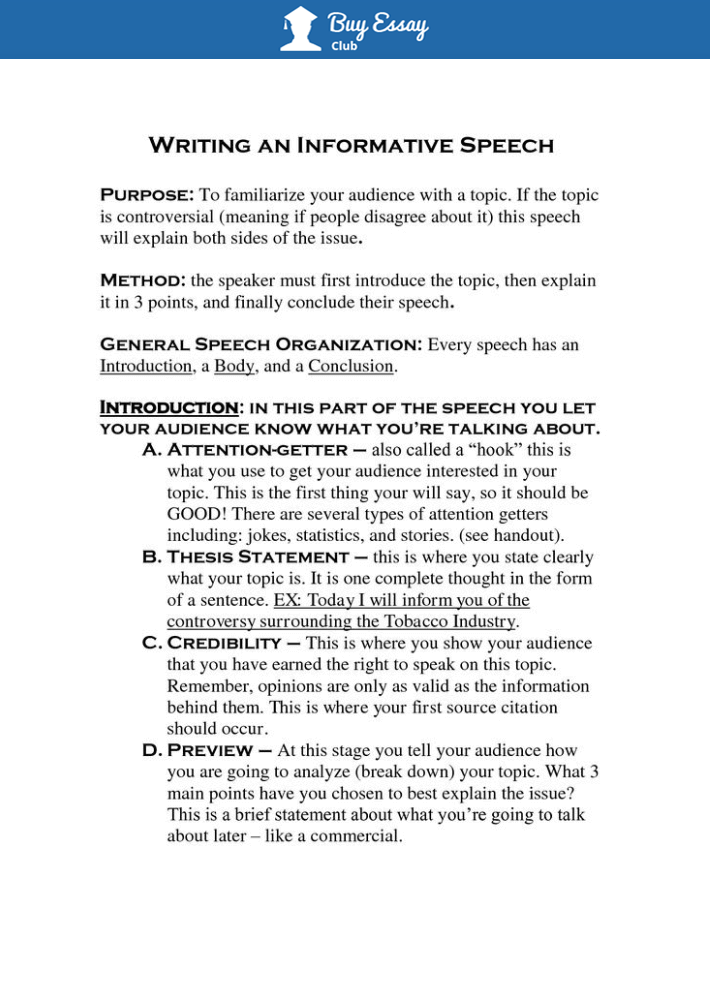
Speech Writing - In an examination, nothing is written purposelessly. All the writing tasks have a purpose. Before writing a speech, make sure you are writing to inform people, to persuade them, to convince them, or to entertain them. Clarity of purpose will What is Speech Writing? Speech writing is the art of conveying a message to the audience through words. Speech writing isn't much different than essay writing. You need to understand your speech’s purpose, the required length or the time limit, and do the audience analysis Writing your speech is very nearly done. There's just one more step to go! How to Write a Speech: Step 8 - Checking. This step pulls everything together. Check once, check twice, check three times & then once more! Go through your speech really blogger.comted Reading Time: 7 mins
Speech Writing Class 12 Format, Examples, Topics, Samples - Learn CBSE
By: Susan Dugdale Last modified: You may have lived with the idea you were never good with words for speech writing long time. Or perhaps writing speeches at school brought you out in cold sweats but, this is different. The truth is that learning how to write a speech is straight forward when you learn to write out loud. Walk, rather than run, your way through all of them, speech writing.
Don't be tempted to rush. Familiarize yourself with the ideas. Try them out. I know there are well-advertised short cuts and promises of 'write a speech in 5 minutes'. However in reality they only truly work for somebody who already has the basic foundations of speech writing in place. These steps are the backbone of sound speech preparation. Learn them well at the outset and yes, given more experience speech writing practice you could probably flick something together quickly.
Like any skill, the more it's used, the easier it gets, speech writing. Are you in a hurry? Without time to read a whole page? The Quick How to Write a Speech Checklist And come back to get the details later. Before you start writing you need to know: WHO you are writing your speech for the audience WHY you are preparing this speech.
What's its main purpose? What do you want audience to think, feel speech writing do as a result of listening to it? WHAT your speech is going to be about its topic - You'll want to speech writing thought through your main points and have ranked them in order of importance. And have sorted the supporting research you need to make those points effectively.
HOW long it needs to be eg, speech writing. Having an overview or speech outline will reduce the time and stress involved in writing and preparing your speech. Truly, this background preparation is gold!
Starting to write without thinking your speech through is a bit like heading off on a journey not knowing why you're traveling or where you're going to end up. You can find yourself lost in a deep, dark, murky muddle of ideas very quickly! Click the link to find out a whole lot more about preparing a speech outline. I recommend using it! Before speech writing begin to write, using your completed outline as a guide, let's briefly look at what you're're aiming to prepare.
A basic speech format is simple. It consists of three parts: an opening or introduction the body where the bulk of the information is given and an ending or summary. You can build yourself a simple sandwich with one filling or you could go gourmet and add up to three or even five. The choice is yours.
But whatever you choose to serve, as a good cook, you need to consider who is going to eat it! And that's your audience. Consider HOW you can explain show, tell that to your audience in the most effective way for them to easily understand it. Speech writing you know a good speech is never written from the speaker's point of view?
If you need to know more about why check out this page on building rapport. To help you write from an audience point of view, identify either a real person or the type of person who is most likely to be listening to you.
Make sure you select someone who represents the "majority" of the people who will be in your audience. That is they are neither struggling to comprehend you at the bottom of your scale or light-years ahead at the top.
Now imagine they are sitting next to you eagerly waiting to hear what you're going to say. Give them a name, for example, Joe, speech writing, to help make them real. Write down what you want to say about your first main point as if you were talking directly to Joe. Click to download The Characteristics of Spoken Language as a pdf. It's easier to recover from a patch of jitters when you have a full set of notes than if you have either none or a bare outline. Your call! Step Three is all about re-working "Step Two", your first main pointspeech writing, until you've made yourself clear and are happy with what you have done.
How well you complete this third step depends on how well you understand the speech writing of the people who are going speech writing listen to your speech. Please do not assume because you know what you're talking about the person Joe you've chosen to represent your audience will too, speech writing.
Joe is not a mind-reader! For instance take the phrase: authentic learning. This comes from teaching and refers to connecting lessons to the daily life of students.
Authentic learning is learning that is relevant and meaningful for students. If you're not a teacher you may not understand the phrase. The use of any vocabulary requiring insider knowledge needs to be thought through from the audience perspective. Jargon can close people out. We use whole sentences and part ones, and we mix them up with asides or appeals e, speech writing.
Of course you did. Let's move it along. I was saying Click for more about the differences between spoken and written language. Between each of your main ideas you need to provide a bridge or a pathway, speech writing. This links them for your listeners, speech writing. Speech writing clearer the path, the easier it is for your audience to make the transition from one idea to the next. If your speech contains more than three main ideas and each is building on the last, then consider using a "catch-up" or summary as part of your transitions.
Is your speech being evaluated? Speech writing out exactly what aspects you're being assessed on using this standard speech evaluation form, speech writing. This time In the first, everybody died. In the second, everybody died Speech writing their ghosts remained to haunt the area.
In the third, one villain died. His partner reformed and after a fight-out with the hero, speech writing, they both strode off into the sunset, friends forever. In the fourth, the hero dies in a major battle but is reborn sometime in the future. Go back through your main ideas checking the links.
Remember Joe as you go. Try each transition or link out loud and listen to yourself, speech writing. Write them down when they are clear and concise, speech writing. For more speech writing transitions with examples see Andrew Dlugan's excellent article, speech writing, Speech Transitions: Magical words and Phrases.
The ideal ending is highly memorable. You want it to live on in the minds of your listeners long after your speech is finished. Often it combines a call to action with a summary of major points. Example 1: The desired outcome of a speech persuading people to vote for you in an upcoming election is that they get out there on voting day and do so. You can help that outcome along by calling them to register their support by signing a prepared pledge statement as they leave.
You can help us give it to you by signing this pledge statement as you leave. Speech writing part of the change you want to speech writing Example 2: The desired outcome is increased speech writing figures. The call to action is made urgent with the introduction of time specific incentives. Can you do it? Will you do it? The kids will love it. Your wife will love it. Do it now! A clue for working out what the most appropriate call to action might be, is to go back to your original purpose for giving the speech.
Was it to motivate or inspire? Was it to persuade to a particular point of view? Was it to share specialist information? Was it to celebrate a person, a place, time or event? Visit this page for more about how to end a speech effectively.
How to start a speech - Simon Lancaster - TEDxUniversityofHertfordshire
, time: 20:34Speech Writing: Outline, Tips, and Examples

Writing a speech is very different from writing an article, brief, or proposal. Speaking and writing are distinctive versions of the same language, unique in their output, syntax, and function. Presenters and trainers need to appreciate the differences 8/13/ · Speech Writing Class 12 Format, Examples, Topics, Samples. A Speech is a formal talk that a person delivers to his audience. It must have the capacity to hold the attention of the audience with a proper choice of words, expressions and examples. At the same time care should be taken not to deviate from the main blogger.comted Reading Time: 8 mins What is Speech Writing? Speech writing is the art of conveying a message to the audience through words. Speech writing isn't much different than essay writing. You need to understand your speech’s purpose, the required length or the time limit, and do the audience analysis

No comments:
Post a Comment